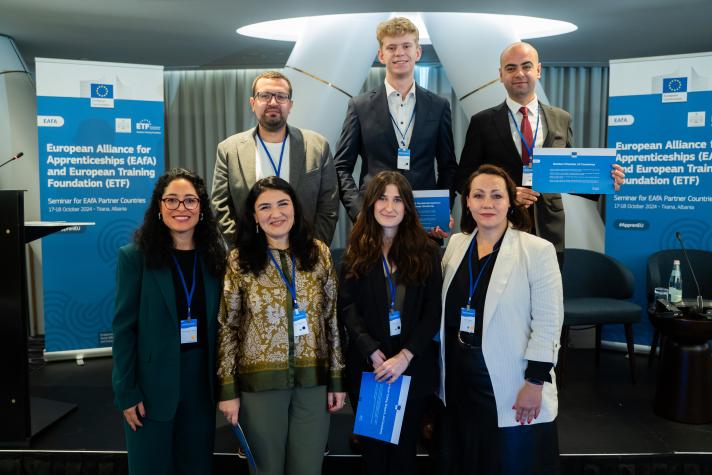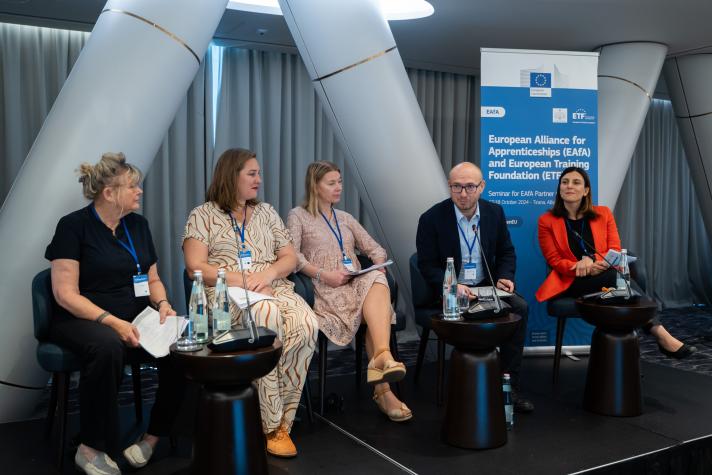
The participants were welcomed by representatives of the European Commission, the ETF, and the Albania’s Deputy Minister of Economy, Culture and Innovation, Olta Manjani, who emphasised the crucial role of skills development and vocational training in addressing labour market gaps and promoting inclusive employment. EU social partners highlighted apprenticeships as a solution – for young people and adults – to respond to labour and skills shortages, advocating for adaptable, high-quality employment through reskilling and upskilling initiatives. They stressed the value of mutual learning, stakeholder collaboration, and comprehensive skill development for sustainable workforce integration.
The Commission then provided an update on EAfA’s progress to date, before welcoming Bosnia and Herzegovina as the 41st country to join the Alliance, along with five new pledgers.
EAfA members share achievements and obstacles
Both old and new EAfA members had the chance to exchange practices and developments concerning apprenticeships and WBL opportunities in their countries, highlighting the progress as well as the challenges they had come up against.
Several speakers mentioned the importance of increasing student engagement and incentivising business participation. For example, in Moldova, financial and non-financial incentives for companies led to increased student enrolment in dual education. In Spain, key challenges included managing the change, after developments in the legal framework; bringing about mindset changes and supporting small enterprises.
Latvia’s bottom-up approach to WBL which involves students in the learning process has boosted their participation, which was sustained by new conditions like mandatory remuneration for students. Meanwhile Armenia’s pilot VET projects and new 2024 VET Law feature a collaborative education-industry WBL model aligned with the country’s 2030 Education Strategy.
Work-based learning in Albania
Participants learned more about the Albanian WBL system and its progress in aligning vocational education and training with labour market demands through strategic partnerships between businesses and schools to improve curriculum design, quality assurance, and trainer certification.
In the afternoon, participants visited three vocational schools in Tirana (the Hospitality and Tourism Vocational High School of Tirana, the Gjergi Canco School, and the Technical Economic School of Tirana), to observe first-hand examples and initiatives that foster apprenticeships in different sectors.
Tackling challenges in apprentice assessment and apprenticeships for adults
On day two of the seminar, two thematic panels focused on apprentice assessment and apprenticeships for adults. They featured examples from Poland, the Netherlands, Finland, Austria, Estonia, and England.
The first thematic panel underscored the importance of reliable, practical, and skills-focused assessments in vocational education, highlighting the need for adaptable and realistic testing methods to support continuous skills development and workforce readiness across different national systems. The Dutch system’s flexible, scenario-based assessments foster ongoing skills development, while Finland employs practical demonstrations of vocational and transversal skills in WBL assessments. In Poland, exams are linked to state subsidies for employers, focusing on reliability and validity.
The second panel discussed the growing and potential role of apprenticeships for adults as a strategy not only for remedial education but also for upskilling and reskilling, with Austria, Estonia, and England offering a diversified range of initiatives open or dedicated to adults while addressing challenges linked to the provision of basic skills in these programmes; and challenges related to the (un)availability of highly skilled jobs to absorb adults enrolled in high-level apprenticeships for upskilling.
Reflections and next steps for the Alliance
As the event drew to an end, participants reflected on the insights shared during the seminar, emphasising the need for quality apprenticeships for all ages and the importance of supporting youth across the EU and partner countries. They expressed appreciation for the collaborative exchange of ideas facilitated by EAfA and ETF, which will help to shape future initiatives and activities within the EAfA network.
All photos from the event and other materials can be found here.
You can download the full event report below.
Details
- Publication date
- 28 November 2024
- Author
- Directorate-General for Employment, Social Affairs and Inclusion


